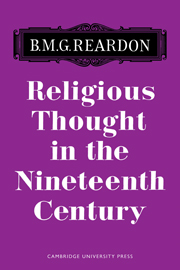Book contents
- Frontmatter
- Preface
- Contents
- Introduction
- PART I EUROPEAN
- PART II BRITISH AND AMERICAN
- 1 Coleridge
- 2 F. D. Maurice
- 3 Newman
- 4 Mansel
- 5 J. S.Mill
- 6 Benjamin Jowett and Essays and Reviews
- 7 Matthew Arnold
- 8 Scott Holland and Lux Mundi
- 9 The British Hegelians
- 10 Emerson
- 11 Josiah Royce
- 12 William James
- Index of Works Cited
- Frontmatter
- Preface
- Contents
- Introduction
- PART I EUROPEAN
- PART II BRITISH AND AMERICAN
- 1 Coleridge
- 2 F. D. Maurice
- 3 Newman
- 4 Mansel
- 5 J. S.Mill
- 6 Benjamin Jowett and Essays and Reviews
- 7 Matthew Arnold
- 8 Scott Holland and Lux Mundi
- 9 The British Hegelians
- 10 Emerson
- 11 Josiah Royce
- 12 William James
- Index of Works Cited
Summary
In the context of his age Matthew Arnold is a key-figure. He fully shared its moral concern, if not all its moral attitudes. He was a man with a mission, who could not be content with the role solely of poet or literary critic, dedicated as these callings might be. He became an apostle of ‘culture’, a word not to be taken in any merely aesthetic sense-despite the necessity, for the critic, of a truly critical ‘detachment’—but as implying a force for moral good. That he was conscious of this missionary purpose is-save for his verse, in which he appears in a different light—clear in all he wrote. A statement in a private letter of 1863 reveals not only a sense of duty to be done but of fervour in doing it: ‘It is very animating to think that one at last has a chance of getting at the English public. Such a public as it is and such a work as one wants to do with it.’ As a poet, however, and occasionally even as a literary critic, it is the ‘other’ self that speaks-introverted, selfdoubting, nostalgic:
Ah! two desires toss about
The poet's feverish blood.
One drives him to the world without,
And one to solitude.
So acutely aware of this was he that he could describe himself as ‘fragments’. But here too he is a key-figure: his age, for all its apparent certitudes, was fragmented. His own incertitude especially betrays itself in his attitude to religion, with which alone we are concerned.
- Type
- Chapter
- Information
- Religious Thought in the Nineteenth Century , pp. 324 - 337Publisher: Cambridge University PressPrint publication year: 1966

